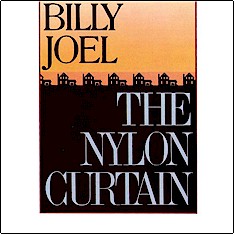 A couple years back, I sat at the bar at a local watering hole, having a conversation with an older gentleman about the Gettysburg War memorials, which had been in the news at that time for one or another reason. When we exhausted that topic, I bought him a beer and we continued talking, about wars and armies and things that soldiers (like him) knew that those who have never served (like me) don’t know. He had served in the Vietnam War, and when I mentioned that my mother-in-law had, too (as an Army nurse, in 1965), my new friend told me that when I saw her next to tell her “Welcome home” for him.
A couple years back, I sat at the bar at a local watering hole, having a conversation with an older gentleman about the Gettysburg War memorials, which had been in the news at that time for one or another reason. When we exhausted that topic, I bought him a beer and we continued talking, about wars and armies and things that soldiers (like him) knew that those who have never served (like me) don’t know. He had served in the Vietnam War, and when I mentioned that my mother-in-law had, too (as an Army nurse, in 1965), my new friend told me that when I saw her next to tell her “Welcome home” for him.
The “Support the Troops” ethos America has embraced for the last two decades (since the first Gulf War) began as an attempt, however subconscious, to compensate for the shit treatment—from indifference to outright hostility—a lot of Vietnam War soldiers received upon returning to the U.S. when their tours of duty ended. When the guy at the bar told me to welcome Ann home, he meant it sincerely, from one soldier to another. It was meant to be a comfort he had not been afforded upon his return; it was also an acknowledgment, again, that soldiers know things that those who have never served do not.
These days, while both that “Support the Troops” ethos and the general tenor of the country since 9/11 yield a great deal of flag-waving and gung-ho energy in our pop culture, in the years immediately following the end of the Vietnam War, there were few overt artistic touchstones. Most of those were harrowing, if not hallucinogenic, and appropriately violent. Think The Deer Hunter, Taxi Driver, and Apocalypse Now in film; or Tim O’Brien’s Going After Cacciato and Robert Stone’s The Dog Soldiers in literature. By 1982, David Morrell’s decade-old thriller First Blood—about a Vietnam POW who returns to the States and holds off a National Guard manhunt in a small Kentucky town—finally became a movie, with Sylvester Stallone portraying the book’s protagonist, John Rambo, in a significantly less-cartoonish manner than he would in subsequent sequels.
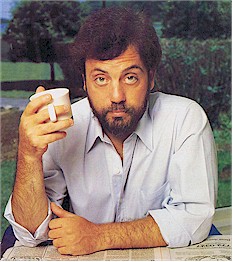 Popular music had seen its share of protest songs, certainly, but the war’s aftermath had eluded most artists’ radar until 1982, when three of America’s most popular musicians weighed in with stark, haunting takes on the experiences of vets who returned home damaged in significant ways. Stevie Wonder’s “Front Line” dropped its soldier—now a double amputee—back in the distressing poverty and drug culture of his inner city home. Charlie Daniels Band’s take on Dan Dailey’s “Still in Saigon” is a disturbing character study of the dutiful soldier haunted by memories of “the wounded cries and the silence of the dead.” To this day, Daniels’ voice in the song’s last verse gives me chills.
Popular music had seen its share of protest songs, certainly, but the war’s aftermath had eluded most artists’ radar until 1982, when three of America’s most popular musicians weighed in with stark, haunting takes on the experiences of vets who returned home damaged in significant ways. Stevie Wonder’s “Front Line” dropped its soldier—now a double amputee—back in the distressing poverty and drug culture of his inner city home. Charlie Daniels Band’s take on Dan Dailey’s “Still in Saigon” is a disturbing character study of the dutiful soldier haunted by memories of “the wounded cries and the silence of the dead.” To this day, Daniels’ voice in the song’s last verse gives me chills.
Side One of Billy Joel’s 1982 album The Nylon Curtain ends with “Goodnight Saigon,” a seven-minute fever dream of war, told in the voice of a man recounting the horrors he’d encountered, as well as the swell of gallantry and the brotherly bonds held together by duty and the fear of what might lurk just ahead. Joel sings the song’s verses in that man’s voice, with weary quietude, remembering a group of young men who “met as soul mates / On Parris Island” and “left as inmates / From an asylum,” who “came in spastic / Like tameless horses,” only to find that the battles they were gung-ho to fight in were not like the ones in the movies. When Joel sings “Remember Charlie / Remember Baker,” he is not asking a question, but declaring his loyalty, his intention to not forget friends who “left their childhood / On every acre.”
It’s a convincing performance (yes, punctuated with silly spikes of echo/not echo—”As sharp as knives-knives-knives-knives,” and such) that culminates in a refrain both mawkish and sincere—”We would all go down together”—delivered by Joel, backed by a chorus of male voices, doubtless representing the voices of those who survived, as well as that of those lost or left behind.
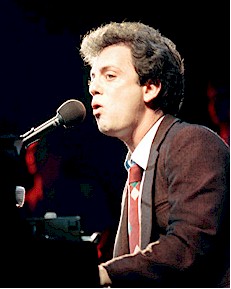 Say what you will about the hokum of the men’s chorus (and lots of people see it as only hokum, Will Ferrell included); “Goodnight Saigon” is affecting stuff, and reflective of the kind of rich texture of The Nylon Curtain as a whole. In the ensuing years, Joel has explained his desire for the record to reflect a sonic adventurousness, sort of a Sgt. Pepperish/Floydian collection of pop songs augmented by orchestral flourishes and sound effects, a Dark Side of the Moon, done Hicksville style. He spent the better part of the spring of 1982 ensconced with producer Phil Ramone in different New York City studios, reveling in the palate each afforded him, going for the feel of a given set of sounds and working them into songs. The resulting record contains an aural richness theretofore absent from Joel’s work, and a collection of songs whose lyrics are equal to that richness
Say what you will about the hokum of the men’s chorus (and lots of people see it as only hokum, Will Ferrell included); “Goodnight Saigon” is affecting stuff, and reflective of the kind of rich texture of The Nylon Curtain as a whole. In the ensuing years, Joel has explained his desire for the record to reflect a sonic adventurousness, sort of a Sgt. Pepperish/Floydian collection of pop songs augmented by orchestral flourishes and sound effects, a Dark Side of the Moon, done Hicksville style. He spent the better part of the spring of 1982 ensconced with producer Phil Ramone in different New York City studios, reveling in the palate each afforded him, going for the feel of a given set of sounds and working them into songs. The resulting record contains an aural richness theretofore absent from Joel’s work, and a collection of songs whose lyrics are equal to that richness
For all of Joel’s Sgt. Pepper aspirations, The Nylon Curtain might be more akin to Abbey Road in its overall sound, and in Joel’s propensity for shaping his voice into very Lennonish and McCartneyan curves. It takes brass balls to attempt to emulate either one; Joel’s scrotum hung heavy with the stuff on “Laura,” Side One’s second song, containing the most obvious impersonations on the record of both Lennon and McCartney. He’s all Lennon on the verses, describing his poison beloved in terms that skitter very close to misogyny; the first goes like this:
Laura
Calls me
In the middle of the night
Passes on her
Painful information
Then these careless fingers
They get caught in her vice
Til they’re bleeding
On my coffee table
He apes the thinner timbre of Lennon’s voice, even tacking on a bit of studio effect to mold it further into a replica, then shine it up a bit. He bears down on the end of each verse, going into full-on “Why Don’t We Do It in the Road”-style McCartney:
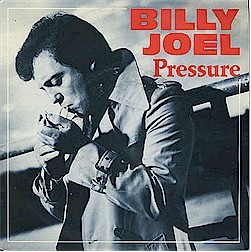 Living alone isn’t all that
Living alone isn’t all that
It’s cracked up to be
I’m on her side
Why does she push the poison on me?
The song hangs for a brief moment, a fleeting beat or three, before sliding back into the Lennon verse voice. And then there’s the infamous middle eight, in which “McCartney” sings:
Here I am
Feeling like a fucking fool
Do I react the way exactly
She intends me to?
Laura is so evil, yet so lovely, she made Paul McCartney’s voice cuss, which I’m sure made “Lennon” laugh, and which seemed all right for Billy Joel, too. “A Room of Our Own,” on Side Two, sounds like another McCartney piano song, like an “Ob-La-Di, Ob-La-Da” or “Back in the U.S.S.R.” It’s another tale of mismatched lovers, a tomato/to-mah-to pair who embrace their differences:
You’ve got diamonds and
I’ve got spades
You’ve got pills
And I’ve got razor blades
You’ve got yoga honey
I’ve got beer
You got overpriced
And I got weird
But it’s alright
We’re the same even though we’re alone
It’s alright
Yes we all need a room of our own
The premise sounds suspiciously familiar, as I’m sure many who have longstanding marriages or long-term relationships recognize the scenario. The song’s form, though, is lifted directly from a certain pair of Liverpudlians. One might also recognize the orchestration in “Scandinavian Skies” as Joel taking a five-finger discount from Magical Mystery Tour and the vocal from “John Lennon” once again. The oddball psychedelic flourishes are a fitting complement to the hazy tale of dope-lulled plane rides while on a tour of Europe. Not merely satisfied with quoting the Beatles, Joel also quotes himself, throwing in snippets of melody from “Say Goodbye to Hollywood” as the trippy six minutes meander slowly by. Better still is the album-closing “Where’s the Orchestra,” with its strings and Tin Pan Alley song structure and McCartney-esque vocal turn (think “When I’m Sixty-Four” or “Martha, My Dear”) and its fadeout quote of The Nylon Curtain‘s first song, “Allentown.”
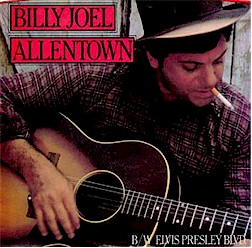 Ah, “Allentown”—the opening salvo of the record, on which Joel puts his “McCartney” voice and chugging piano to the service of the plight of the downtrodden American worker. Easily the record’s biggest single and arguably its most recognizable tune, “Allentown” has probably aged the least well over the years, largely due to the frequency with which radio played it in 1983. Back then, the song was notable for its regional references (particularly for those in Pennsylvania’s Lehigh Valley, who likely had to hear it often and explain it even more often) and for its naked-dudes-in-the-shower video (thanks to director Russell Mulcahy), as much as for its message, set out in the song’s bridge—
Ah, “Allentown”—the opening salvo of the record, on which Joel puts his “McCartney” voice and chugging piano to the service of the plight of the downtrodden American worker. Easily the record’s biggest single and arguably its most recognizable tune, “Allentown” has probably aged the least well over the years, largely due to the frequency with which radio played it in 1983. Back then, the song was notable for its regional references (particularly for those in Pennsylvania’s Lehigh Valley, who likely had to hear it often and explain it even more often) and for its naked-dudes-in-the-shower video (thanks to director Russell Mulcahy), as much as for its message, set out in the song’s bridge—
Every child had a pretty good shot
To get at least as far as their old man got
Something happened on the way to that place
They threw an American flag in our face
At the release of The Nylon Curtain, the U.S. was year and change into Ronald Reagan’s first term; Reagan was elected, in no small part, because he communicated a vision of a brighter, stronger America—a vision embraced by an overwhelming majority of the electorate. For a significant portion of the nation, though, the vision was a mirage, and little of the “trickle-down” promise had trickled down to America’s workers, like those in Allentown, who were watching aghast as their industry—the industry that helped build stuff, that had helped build a nation—dried up and blew away. Not that it had held much overwhelming promise to begin with:
So the graduations hang on the wall
But they never really helped us at all
No they never taught us what was real
Iron and coke, chromium steel
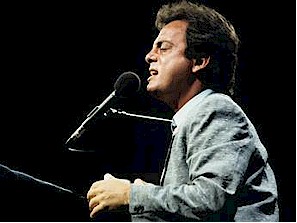 The pictures and the diplomas and the caps and tassels only reminded one of the working man’s reality—essentially, thirteen years of schoolin’ and they put you on the night shift—but it was a living, a way to feed one’s family and shelter them and hope their kids might have something more. Those sentiments evaporated, in Allentown and steel towns all over Pennsylvania, all over the country.
The pictures and the diplomas and the caps and tassels only reminded one of the working man’s reality—essentially, thirteen years of schoolin’ and they put you on the night shift—but it was a living, a way to feed one’s family and shelter them and hope their kids might have something more. Those sentiments evaporated, in Allentown and steel towns all over Pennsylvania, all over the country.
For all its ambition and Beatle-isms, though, The Nylon Curtain also features songs which are notable for Billy Joel sounding more or less like Billy Joel. “Surprises,” with its cascading layers of synthesizers, may be a nod to the likes of Tangerine Dream or other ambient or electronic music of the period, or it may simply have been a result of Joel’s interest in texture for texture’s sake. The structure of the song is familiar, as are its dynamics—particularly when drummer Liberty DeVitto kicks in, in the second verse—but the vocal is plainly Joel being Joel (or, since it’s double-tracked, Joel being Joel-Joel). The odd textures are also front and center in the album’s first single, “Pressure,” a slap at a pretentious other, punctuated by an intense synth hook that sounds closer to a Bach harpsichord piece than to the “Piano Man” riff. Yet it’s still unmistakably Joel, lyrically, vocally, attitudinally—at once both pugnacious and elegant. No one else did pop songs quite the same way.
“She’s Right on Time” is my favorite track on the album, a mid-tempo Christmastime reconciliation ballad that finds Joel in fine voice and his band at its most muscular, particularly DeVitto, who’s pushed up in the mix and whose fills are practically a second lead instrument. After an indeterminate period of estrangement, the singer’s lover is returning to him, just in time for the holidays, and in the first verse, he prepares to welcome her home:
Turn on all the Christmas lights
Cause baby’s coming home tonight
I can hear her footsteps in the street
Turn the choral music higher
Pile more wood upon the fire
That should make the atmosphere complete
The music and melody match the celebratory nature of his homecoming, as Joel begins the song close to his upper register, but with a tension that mimics the nervousness of the protagonist. Perhaps she’s agreed to come home, but the truce is tenuous, and the performance speaks to his apprehension. The second verse digs a little deeper, as the singer rattles off a brief list of his shortcomings:
I’m a man with so much tension
Far too many sins to mention
She don’t have to take it anymore
But she’s chosen to return, and he’s “torn out all my telephones” (why? What’s he been doing with his telephones? This was ’82—were party lines involved? They were expensive), and he not only recognizes his own issues, but also how to best live with them, with her. “I may be going nowhere,” Joel sings, “But I don’t mind if she’s there.” Which is great, yes, but what about her? Why is she returning to this dude? Is it love? A lack of other options? The high cost of rent in Manhattan? The listener doesn’t quite get why she’s coming back, just that he’s happy with the circumstances. Yes, it’s all about him, and we dig down another level in the middle eight:
 Left to my own device
Left to my own device
I can always make believe
That there’s nothing wrong
Still I will choose to live
In the complicated world
That we shared for so long
Good or bad, right or wrong
Rather than addressing the issues as they are, he can make believe everything is fine, especially because she comes back, right on time, “[e]verytime I lost the meter / There she was when I would need her.” This woman is a champ, one with a soft heart for the big lug, a man with too much tension, a complicated man who’s done something to drive her away, but with enough charm to draw her back. Maybe she returns because he can cry a mighty cry of love, as he does after the third chorus, or because he knows Liberty DeVitto, who smacks the shit out of his kit and keeps the pulse of the song going with the power of his right foot. Chicks always dig the drummers, and sometimes they dig the friends of the drummers. The protagonist of “She’s Right on Time” is fortunate in many ways, but none more so than his Liberty connection.
Joel’s ambition is evident throughout The Nylon Curtain, and while sometimes the ambition and the brashness behind it led him to reach for something slightly higher than what he was capable of attaining, he certainly hit more peaks than most who make such an attempt could hope to. The Nylon Curtain is stronger for that ambition, a singular achievement in a recording career that spanned nearly 30 years.





Comments